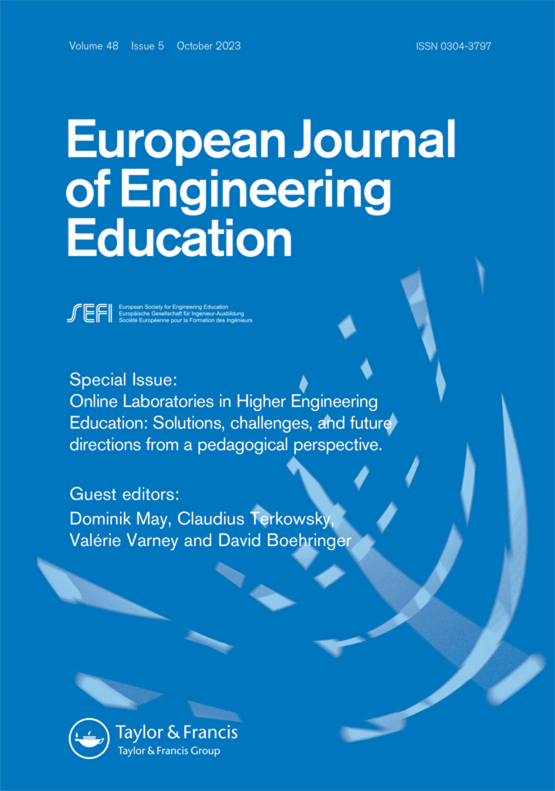Submit a Manuscript to the Journal
European Journal of Engineering Education
For a Special Issue on
Interdisciplinary Learning and Transformation of Engineering Education
Abstract deadline
15 January 2024
Manuscript deadline
15 September 2024

Special Issue Editor(s)
Karolina Doulougeri,
TU Eindhoven, The Netherlands
[email protected]
Anette Kolmos,
Aalborg University, Denmark
[email protected]
Amitava ‘Babi’ Mitra,
Massachusetts Institute of Technology, USA
[email protected]
Henrik Worm Routhe,
Aalborg University, Denmark
[email protected]
Jan van der Veen,
TU Eindhoven, The Netherlands
[email protected]
Interdisciplinary Learning and Transformation of Engineering Education
Theme
As the world faces increasingly complex challenges, there is a pressing need to educate engineers who can contribute to possible solutions. Many universities have responded to the need for transforming engineering education by establishing interdisciplinary programs, interdisciplinary courses, or interdisciplinary projects across existing programs.
There are many examples of scholarly works on integrating interdisciplinary work in engineering curricula (Roy 2021). There are studies on scaffolding of projects and teams indicating models to improve learning (Beddoes 2020, MacLeod and van der Veen 2020, Routhe et al. 2022), interdisciplinary competences (Beagon et al. 2023; Borrego and Newswander 2010, Lattuca, Knight et al. 2013), curricula models for interdisciplinary learning (Fortuin et al. 2023; Knight, Lattuca et al. 2013, Tripp and Shortlidge 2019) and on the understanding of interdisciplinary learning (Klein 2010, Akkerman and Bakker 2011).
However, interdisciplinary learning is not always easy to implement as universities are often organized along disciplinary boundaries. This implies different cultures, languages and educational traditions, as well as administrative borders and classifications. At the institutional level, many universities have declared themselves as mission-driven universities aiming at educating more interdisciplinary graduates (e.g., Hailes et al., 2021; Lavi et al., 2021). However, even when such top-management intentions exist, they will need to be reflected and responded to by the academic staff. Academic staff have many competing tasks and might lack motivation or incentives for creating interdisciplinary tracks in the curriculum (Högfeldt et al. 2023). Most university education programs already suffer from an overloaded curriculum. While interdisciplinary education can motivate students to find solutions to climate change and promote sustainable development in society, it can also pose challenges for them. Further, interdisciplinary education requires space and resources so as to accommodate and coach student teams appropriately.
Aims and scope
In this special issue we are looking for the state-of-the-art research on interdisciplinary learning in engineering education. We welcome evidence-informed research (both qualitative and quantitative) on the following topics:
- How do we educate engineering students to help solve critical societal challenges and what are the learning gains?
- How do faculty staff engage with interdisciplinary education, including their beliefs, attitudes, identity and collaborative practices, rewards and recognition?
- How is interdisciplinary learning linked with engineering practice and industry stakeholders?
Submissions should demonstrate a clear focus on advancing the conceptualization and practice of interdisciplinarity in engineering education, in the context of programmatic and institutional transformation. We are particularly interested in research that presents novel methodologies, results, understandings, pedagogical strategies, or successful interventions which can contribute to the transformation of engineering education.
Looking to Publish your Research?
Find out how to publish your research open access with Taylor & Francis Group.
Choose open accessSubmission Instructions
Instructions for authors
Extended abstracts should be anonymized and limited to 800-1000 words, plus references. The abstract should be a summary of the article and include:
- Aims or research questions
- Contextualization in literature
- Methodology
- Findings
- Perspectives
Submission is free-format and manuscripts are formatted to journal style upon publication.